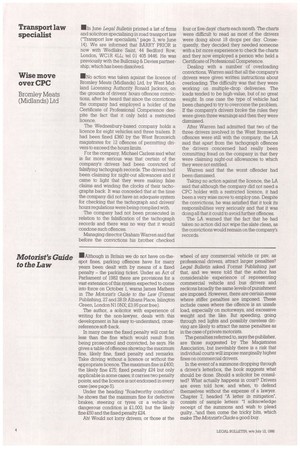Motorist's Guide to the Law
Page 30

If you've noticed an error in this article please click here to report it so we can fix it.
Although in Britain we do not have on-thespot fines, parking offences have for many years been dealt with by means of a fixed penalty the parking ticket. Under an Act of Parliament of 1982 there are provisions for a vast extension of this system expected to come into force on October 1, warns James Mathers in The Motorist's Guide to the Law (Format Publishing, 27 and 28 St Albans Place, Islington Green, London NI ONX; £3.95 post free).
The author, a solicitor with experience of writing for the non-lawyer, deals with this development in his easy to-understand, crossreference soft-back.
In many cases the fixed penalty will cost far less than the fine which would result from being prosecuted and convicted, he says. He gives a table of offences showing the maximum fine, likely fine, fixed penalty and remarks. Take driving without a licence or without the appropriate licence. The maximum fine is £400; the likely fine £75; fixed penalty £24 but only applicable in some cases; it carries two penalty points; and the licence is not endorsed in every case (see page 6).
Under the heading "Roadworthy condition" he shows that the maximum fine for defective brakes, steering or tyres or a vehicle in dangerous condition is £1,000, but the likely fine £50 and the fixed penalty £24.
Ah! Would not lorry drivers, or those at the wheel of any commercial vehicle or psv, as professional drivers, attract larger penalties? Legal Bulletin asked Format Publishing just that, and we were told that the author has considerable experience of representing commercial vehicle and bus drivers and reckons broadly the same levels of punishment are imposed. However, there are certain areas where stiffer penalties are imposed. These include cases where the offence is an unsafe load, especially on motorways, and excessive weight and the like. But speeding, going through red lights and possibly careless driving are likely to attract the same penalties as in the case of private motorists.
The penalties referred to, says the publisher, are those suggested by The Magistrates Association, but inevitably there is a risk that individual courts will impose marginally higher fines on commercial drivers.
In the event of a summons dropping through a driver's letterbox, the book suggests what should be done. Should a solicitor be consulted? What actually happens in court? Drivers are even told how, and when, to defend themselves without the expense of a lawyer. Chapter 7, headed "A letter in mitigation'', consists of sample letters acknowledge receipt of the summons and wish to plead guilty... 'and then come the tricky bits, which make The Motorist's Guide a good buy.




















































































